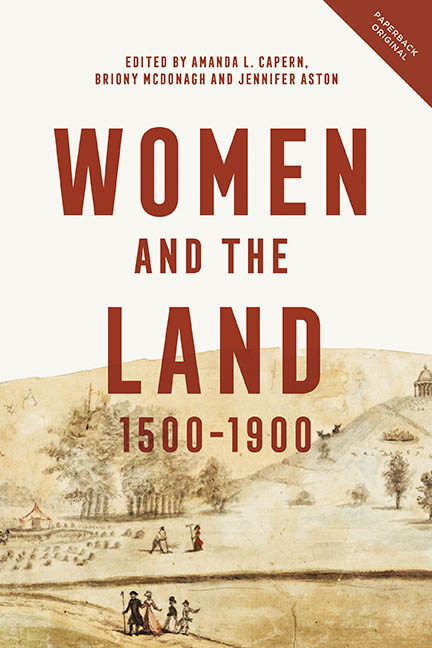Book contents
- Frontmatter
- Contents
- List of Illustrations
- List of Contributors
- Introduction: Women, Property and Land
- 1 Women, Work and Land: The Spatial Dynamics of Gender Relations in Early Modern England 1550–1750
- 2 Spinsters with Land in Early Modern England: Inheritance, Possession and Use
- 3 Becoming Anne Clifford
- 4 The Heiress Reconsidered: Contexts for Understanding the Abduction of Arabella Alleyn
- 5 From Magnificent Houses to Disagreeable Country: Lady Sophia Newdigate's Tour of Southern England and Derbyshire, 1748
- 6 On Being ‘fully and completely mistress of the whole business’: Gender, Land and Estate Accounting in Georgian England
- 7 Negotiating Men: Elizabeth Montagu, ‘Capability’ Brown and the Construction of Pastoral
- 8 Women's Involvement in Property in the North Riding of Yorkshire in the Eighteenth and Nineteenth Centuries
- 9 Invisible Women: Small-scale Landed Proprietors in Nineteenth-century England
- 10 More than Just a Caretaker: Women's Role in the Intergenerational Transfer of Real and Personal Property in Nineteenth-century Urban England, 1840–1900
- Afterword
- Select Bibliography
- Index
- PEOPLE, MARKETS, GOODS: ECONOMIES AND SOCIETIES IN HISTORY
2 - Spinsters with Land in Early Modern England: Inheritance, Possession and Use
Published online by Cambridge University Press: 21 March 2020
- Frontmatter
- Contents
- List of Illustrations
- List of Contributors
- Introduction: Women, Property and Land
- 1 Women, Work and Land: The Spatial Dynamics of Gender Relations in Early Modern England 1550–1750
- 2 Spinsters with Land in Early Modern England: Inheritance, Possession and Use
- 3 Becoming Anne Clifford
- 4 The Heiress Reconsidered: Contexts for Understanding the Abduction of Arabella Alleyn
- 5 From Magnificent Houses to Disagreeable Country: Lady Sophia Newdigate's Tour of Southern England and Derbyshire, 1748
- 6 On Being ‘fully and completely mistress of the whole business’: Gender, Land and Estate Accounting in Georgian England
- 7 Negotiating Men: Elizabeth Montagu, ‘Capability’ Brown and the Construction of Pastoral
- 8 Women's Involvement in Property in the North Riding of Yorkshire in the Eighteenth and Nineteenth Centuries
- 9 Invisible Women: Small-scale Landed Proprietors in Nineteenth-century England
- 10 More than Just a Caretaker: Women's Role in the Intergenerational Transfer of Real and Personal Property in Nineteenth-century Urban England, 1840–1900
- Afterword
- Select Bibliography
- Index
- PEOPLE, MARKETS, GOODS: ECONOMIES AND SOCIETIES IN HISTORY
Summary
This chapter offers an analysis of the land that was held by spinsters in England from the mid-sixteenth to the end of the seventeenth century. Although our knowledge of landholding by women is increasing, there is little published work on the amount of land held by those who did not marry, even though their number, as a proportion of the population, was expanding for much of the early modern period. At the same time, and because the bulk of women (at least 75 per cent) still did marry, this analysis aims to shed new light on the relationship between women and land during that period. Research so far suggests that patterns of change varied between areas and according to social and marital status. Barbara Harris claimed that even though legal devices had been developed to circumvent primogeniture and the restrictions of male tail in the late medieval period, between 1450 and 1550 ‘much less than 20 per cent of the land that belonged to the aristocracy descended to female heirs’. Eileen Spring's provocative study of the downward slide of the heiress-at-law between 1300 and 1800 was also largely built upon evidence from aristocratic and gentry families, although she argued that her findings applied more broadly.
For ‘ordinary’ English families the picture appears to have been only slightly better. In the village of Brigstock in Northamptonshire in the early fourteenth century, Judith Bennett found that for every four sons who conveyed or received lands, only one daughter did so. That few single women had large amounts of land can be explained by reference to the fact that daughters tended to inherit only in default of surviving sons, and then property was generally shared between all surviving daughters; inter-vivos transfers also favoured sons. At Orwell in the sixteenth and seventeenth centuries, Spufford too noted that it was uncommon for women to inherit, although possibilities did exist: they could do so in the absence of a son, or ‘at the whim of an eccentric father, or even grandmother’. What Spufford's work does suggest, however, is that women's ability to access land had increased in some areas by the end of the early modern period. In Willingham and Chippenham very few women's names appear as possessors of land in the sixteenth and early seventeenth centuries.
- Type
- Chapter
- Information
- Women and the Land, 1500–1900 , pp. 51 - 76Publisher: Boydell & BrewerPrint publication year: 2019



